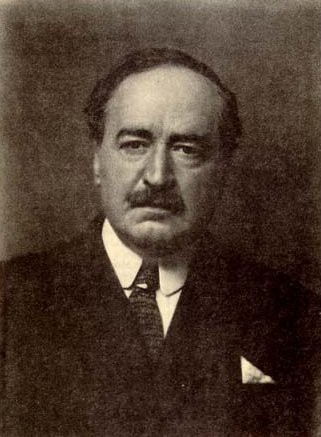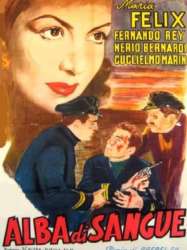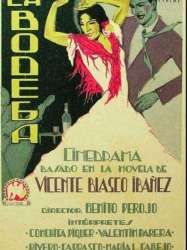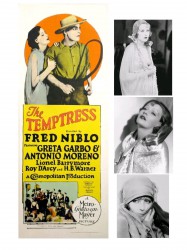Vicente Blasco Ibáñez est un Scénariste Espagnol né le 29 janvier 1867 à Valence (Espagne)

Vicente Blasco Ibáñez (29 January 1867 – 28 January 1928) was a journalist, politician and best-selling Spanish novelist in various genres whose most widespread and lasting fame in the English-speaking world is from Hollywood films adapted from his works.
In politics he was a militant Republican partisan in his youth and founded a newspaper, El Pueblo (translated as either The Town or The People) in his hometown. The newspaper aroused so much controversy that it was taken to court many times. In 1896, he was arrested and sentenced to a few months in prison. He made many enemies and was shot and almost killed in one dispute. The bullet was caught in the clasp of his belt. He had several stormy love affairs.
He volunteered as the proofreader for the novel Noli Me Tangere, in which the Filipino patriot José Rizal expressed his contempt of the Spanish colonization of the Philippines.
He travelled to Argentina in 1909 where two new cities, Nueva Valencia and Cervantes, were created. He gave conferences on historical events and Spanish literature. Tired and disgusted with government failures and inaction, Vicente Blasco Ibáñez moved to Paris at the beginning of World War I.
He was a supporter of the Allies in World War I.
He died in Menton, France in 1928, the day before his 61st birthday, in the residence of Fontana Rosa (also named the House of Writers, dedicated to Miguel de Cervantes, Charles Dickens and Honoré de Balzac) that he built.
Source : Wikidata
Vicente Blasco Ibáñez

- Infos
- Photos
- Meilleurs films
- Famille
- Personnages
- Récompenses
Nom de naissance Vicente Blasco Ibáñez
Nationalité Espagne
Naissance 29 janvier 1867 à Valence (Espagne)
Mort 28 janvier 1928 (à 60 ans) à Menton (France)
Nationalité Espagne
Naissance 29 janvier 1867 à Valence (Espagne)
Mort 28 janvier 1928 (à 60 ans) à Menton (France)
Biographie
He was born in Valencia. At university, he studied law and graduated in 1888 but never went into practice. He was more interested in politics, journalism, literature and women. He was a particular fan of Miguel de Cervantes.In politics he was a militant Republican partisan in his youth and founded a newspaper, El Pueblo (translated as either The Town or The People) in his hometown. The newspaper aroused so much controversy that it was taken to court many times. In 1896, he was arrested and sentenced to a few months in prison. He made many enemies and was shot and almost killed in one dispute. The bullet was caught in the clasp of his belt. He had several stormy love affairs.
He volunteered as the proofreader for the novel Noli Me Tangere, in which the Filipino patriot José Rizal expressed his contempt of the Spanish colonization of the Philippines.
He travelled to Argentina in 1909 where two new cities, Nueva Valencia and Cervantes, were created. He gave conferences on historical events and Spanish literature. Tired and disgusted with government failures and inaction, Vicente Blasco Ibáñez moved to Paris at the beginning of World War I.
He was a supporter of the Allies in World War I.
He died in Menton, France in 1928, the day before his 61st birthday, in the residence of Fontana Rosa (also named the House of Writers, dedicated to Miguel de Cervantes, Charles Dickens and Honoré de Balzac) that he built.
Ses meilleurs films
Le plus souvent avec
Filmographie de Vicente Blasco Ibáñez (15 films)
Scénariste

L'indomptée (1989)
, 1h53Origine Etats-Unis
Genres Drame, Romance
Acteurs Sharon Stone, Ana Torrent, Simón Andreu, Antonio Flores, José Luis de Vilallonga
Rôle Créateur de nouvelle
Note46%





A 19 ans, Juan rêve de devenir toreador Sa famille s'opposant à ce souhait, il la quittera. Il rencontrera un ancien banderillero qui l'entraînera et parrainné par un riche notable, il accumulera les succès dans l'arène. Son aura fascinera son public et la belle Dona qui l'entraînera sans pitié sur la pente de sa perdition.
 , 2h33
, 2h33Réalisé par Vincente Minnelli
Origine Etats-Unis
Genres Drame, Guerre
Thèmes Politique, Histoire de France, L'Occupation allemande en France
Acteurs Glenn Ford, Paul Henreid, Ingrid Thulin, Charles Boyer, Lee J. Cobb, Paul Lukas
Rôle Créateur de nouvelle
Note64%





Pendant la Seconde Guerre mondiale, le conflit entre les deux branches, l'une française et l'autre allemande, dont est issue une famille argentine, sur fond de nazisme et d'occupation de Paris.

Flor de mayo (1959)
, 1h54Réalisé par Roberto Gavaldón
Genres Drame
Acteurs María Félix, Jack Palance, Pedro Armendáriz, Carlos Montalbán, Jorge Martínez de Hoyos, Emma Roldán
Rôle Créateur de nouvelle
Note68%






Mare nostrum (1948)
, 1h30Réalisé par Rafael Gil
Genres Drame
Thèmes Espionnage, La mer, Transport, Politique
Acteurs María Félix, Fernando Rey, Guillero Marín, José Nieto, Eduardo Fajardo, Angel de Andrés Miquel
Rôle Créateur d'histoire originale
Note64%






La Baraque (1945)
, 1h58Réalisé par Roberto Gavaldón
Origine Mexique
Genres Drame
Acteurs Anita Blanch, Luana Alcañiz, Manolo Fábregas, José Baviera, Carlos Villarías
Rôle Créateur de nouvelle
Note69%





Fin du XIX siècle, dans la région de Valence en Espagne. Un paysan endetté, l'oncle Barret, perd ses terres et sa maison (la barraca). Désespéré, il finit par assassiner son créancier, don Salvador. Incarcéré, sa famille est disgraciée. Mais, les années suivantes, la propriété n'a pas été cédée car les voisins, demeurés fidèles aux Barret, l'ont interdite. Un jour, pourtant, une famille étrangère contracte un accord avec les héritiers de don Salvador pour s'installer sur ces terres. Batiste Borrull, le nouveau propriétaire, homme tenace et résolu, devra affronter l'hostilité environnante pour défendre son droit à vivre et travailler sur son domaine.

Arènes sanglantes (1941)
, 2h5Réalisé par Budd Boetticher, Rouben Mamoulian, Robert D. Webb
Origine Etats-Unis
Genres Drame, Action, Romance
Thèmes Mise en scène d'un animal, Sport, Tauromachie, Films pour enfants
Acteurs Tyrone Power, Linda Darnell, Rita Hayworth, Alla Nazimova, Anthony Quinn, J. Carrol Naish
Rôle Créateur de nouvelle
Note67%





Fils de torero, Juan Gallardo rêve de gloire et d’endosser l’illustre habit de lumières à l’image de son père mort dans l’arène. Vivant pauvrement à Séville avec sa famille, il quitte la maison pour faire carrière à Madrid dans la tauromachie. Après quelques années, il réussit à se faire un nom auprès d’aficionados. Auréolé de gloire, il retourne à Séville, retrouve sa famille et son amie d’enfance, Carmen. Ils se déclarent leur amour et se marient. Réalisant de spectaculaires corridas, Juan est maintenant à son apogée. Encensé par tous, il est remarqué par la troublante séductrice Doña Sol, une superbe aristocrate habituée au milieu mondain. Malgré les mises en garde de son entourage, Juan se laisse envoûter par la belle Doña Sol et devient son jouet. Il délaisse alors sa jeune épouse et ne s’intéresse plus à la tauromachie. Doña Sol ne tardera pas à s’intéresser à un autre torero dont l’étoile commence à briller et quittera Juan. La mort de son ami Nacional le ramène à la raison et, malgré les supplications de Carmen, retourne dans l’arène pour affronter son destin.

La bodega (1930)
, 1h27Réalisé par Benito Perojo
Origine France
Acteurs Colette Darfeuil, Gabriel Lelièvre
Note62%





L'histoire se déroule dans un village d'Andalousie. Fermin travaille dans l'exploitation vinicole du riche Pablo Dupont. Il vit avec sa fille Maria Luz. Il recueille chez lui Raphaël, un jeune parent, contrebandier en fuite. Raphaël et Maria Luz s'aiment et se fiancent. Pablo le propriétaire courtise également Maria Luiz et au cours d'une fête du vin, où elle s'est enivrée, il abuse d'elle [...]

Mare Nostrum (1926)
, 1h42Réalisé par Rex Ingram, Rex Ingram
Origine Etats-Unis
Genres Drame, Guerre, Espionnage
Thèmes Espionnage, La mer, Transport, Guerre en milieu sous-marin, Politique
Acteurs Antonio Moreno, Alice Terry, Hughie Mack, Fernand Mailly, Andrews Engelmann, Frédéric Mariotti
Rôle Créateur de nouvelle
Note67%





As a young boy growing up in a Spanish family with a long and very distinguished maritime tradition, Ulysses Ferragut is regaled with tales of the sea by his retired uncle, the "Triton" (Apollon), and is particularly fascinated by his claim to have once seen the sea goddess Amphitrite. Though his lawyer father, Don Esteban, wants him to follow in his footsteps, Ulysses becomes a sailor.

Le Torrent (1926)
, 1h27Réalisé par Monta Bell
Origine Etats-Unis
Genres Drame, Mélodrame, Romance
Acteurs Ricardo Cortez, Greta Garbo, Gertrude Olmstead, Edward Connelly, Lucien Littlefield, Martha Mattox
Rôle Créateur de nouvelle
Note68%





Dans une petite ville en Espagne, les Brull possèdent tout. La mère Brull exige d'ailleurs que la famille Moreno, ses fermiers, paie ses dettes. Elle n'accepte pas non plus que son fils, Rafael, soit amoureux de Leonora Moreno, leur fille. Leonora a un joli filet de voix et est encouragée par le coiffeur à exercer son talent.

La Tentatrice (1926)
, 1h57Réalisé par Mauritz Stiller, Fred Niblo
Origine Etats-Unis
Genres Drame, Mélodrame, Romance
Acteurs Greta Garbo, Antonio Moreno, Lionel Barrymore, Marc McDermott, Armand Kaliz, Roy D'Arcy
Rôle Créateur de nouvelle
Note68%





L'ingénieur Manuel fait la connaissance de la fabuleuse Elena à un bal masqué à Paris. Ils tombent amoureux. Manuel apprend rapidement qu'Elena est mariée, à un marquis, et qu'elle a même amené un de ses amants à la faillite et au suicide. Entre son amour (et sa déception) pour cette femme et sa carrière, Manuel choisit cette dernière et un immense chantier. Manuel part en Argentine construire un barrage.

Circé (1924)
, 1h14Réalisé par Robert Z. Leonard
Origine Etats-Unis
Genres Drame
Acteurs Mae Murray, James Kirkwood Sr., Tom Ricketts, Robert Z. Leonard, Charles K. Gerrard, William Haines
Rôle Histoire
Note58%





Cecilie Brunne, désillusionnée à 18 ans après avoir quitté un couvent de la Nouvelle-Orléans, jure que tous les hommes paieront pour ce qu'elle a perdu. Insensible au désir qu'elle suscite, elle tourmente ses victimes. Seul le Docteur Van Martyn résiste à ses charmes. D'abord dépitée, elle trouve la vie impossible sans son amour et donne une fête sauvage dans sa villa de Long Island. À l'apogée d'une orgie de boisson, de jeux de hasard et de danse, Cecilie se rend compte qu'elle ne peut pas continuer cette vie et elle se retire au couvent de la Nouvelle-Orléans. Un jour, elle se fait écraser en sauvant la vie d'un enfant et on craint qu'elle ne puisse plus jamais marcher. Van Martyn entre dans la pièce et Cecilie trébuche dans ses bras.

Le Tango tragique (1924)
, 1hRéalisé par Allan Dwan
Origine Etats-Unis
Genres Drame, Romance
Acteurs Bebe Daniels, Ricardo Cortez, James Rennie, Mario Majeroni, Julia R. Hurley
Rôle Histoire

Enemies of Women (1923)
, 1h45Réalisé par Alan Crosland
Origine Etats-Unis
Genres Drame, Romance
Acteurs Alma Rubens, Lionel Barrymore, Pedro de Cordoba, Gareth Hughes, Gladys Hulette, William Collier Jr.
Rôle Créateur de nouvelle
Note49%






Arènes sanglantes (1922)
, 1h20Réalisé par Dorothy Arzner, Fred Niblo
Origine Etats-Unis
Genres Drame, Romance
Thèmes Mise en scène d'un animal, Sport, Tauromachie
Acteurs Rudolph Valentino, Lila Lee, Nita Naldi, Walter Long, Charles Belcher, Leo White
Rôle Créateur de nouvelle
Note62%





Juan Gallardo (Rudolph Valentino), un jeune garçon de village né dans la pauvreté, grandit pour devenir un des plus grands matadors d'Espagne. Il épouse son amie d'enfance, la belle et vertueuse Carmen (Lila Lee), mais après avoir rencontré fortune et gloire, il éprouve une attirance pour Doña Sol (Nita Naldi), riche et séduisante veuve. Les amants s'engagent dans une relation torride teintée de sadomasochisme, mais Juan, se sentant coupable de sa trahison envers Carmen, essaie de se libérer de sa double vie avec Doña Sol. Furieuse de se voir rejetée, celle-ci dévoile leur relation à Carmen et à la mère de Juan, détruisant apparemment leur mariage. De plus en plus malheureux, Juan se réfugie dans le travail et combat inlassablement les taureaux. Il trouve la mort dans l'arène, mais réussit à se réconcilier avec Carmen juste avant de mourir.
 , 2h12
, 2h12Réalisé par Rex Ingram, Rex Ingram
Origine Etats-Unis
Genres Drame, Guerre, Romance
Thèmes Danse, Politique
Acteurs Josef Swickard, Bridgetta Clark, Rudolph Valentino, Wallace Beery, Alice Terry, Alan Hale
Rôle Créateur de nouvelle
Note70%





Julio Madariaga, riche propriétaire argentin, a deux filles, Louisa, l'aînée, mariée au Français Marcelo Desnoyers, et Elena, la cadette, mariée à l'Allemand Karl von Hartrott, que le père n'apprécie guère. Après sept années sans enfants, Marcelo et sa femme ont un fils, Julio, qui va devenir le préféré de Madariaga. Avec lui, il va souvent dans les bars de la banlieue de Buenos Aires appelée Boca. C'est dans un de ces bars que se déroule la fameuse scène du Tango (qui permettra à Rudolph Valentino d'acquérir une certaine notoriété). À la mort de Madariaga, les deux familles décident de retourner en Europe, l'une en France et l'autre en Allemagne. À Paris, Julio a une liaison avec Marguerite Laurier, la femme d'un des amis de son père. Ce dernier devient collectionneur de meubles anciens et achète un château près de la Marne pour les entreposer. Julio est prévenu par le mystique Tchernoff que les prophéties relatives à l'Apocalypse - Les quatre Cavaliers : la Peste, la Guerre, la Famine, la Mort - sont sur le point de se réaliser. La guerre est déclarée. Laurier, découvrant l'adultère de sa femme, s'engage dans l'armée. Marguerite, prise de remords, s'engage comme infirmière. Les hordes allemandes avancent vers la Marne et le vieux Desnoyers se trouve en face de son neveu von Hartrott lors de l'occupation de son château.
 Connexion
Connexion




